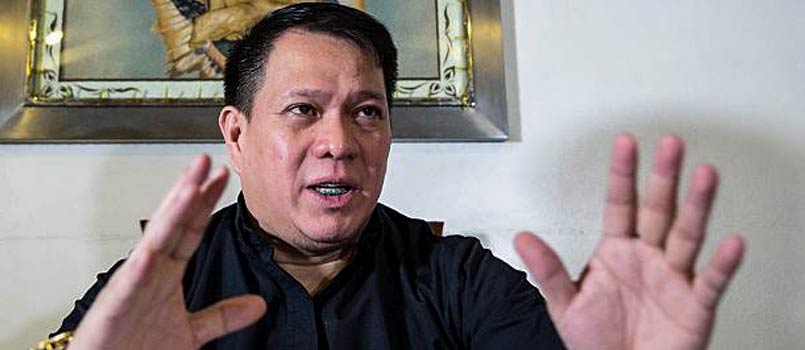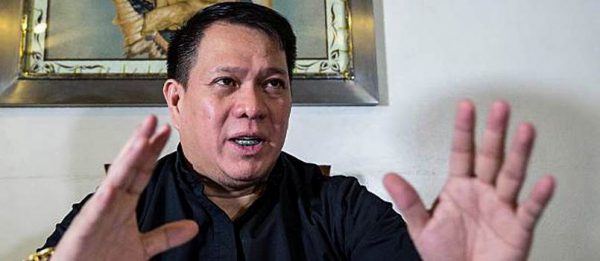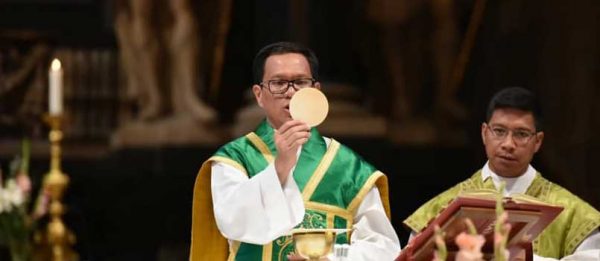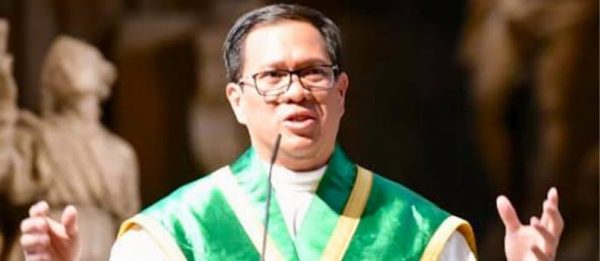582 total views
‘’The government should not make as an excuse the upholding of national security while undermining human
rights and civil liberties. To do so makes the government terrorist against its own constituents’’.
By: Rev. FR. Jerome R. Secillano, MPA
The controversial Anti-Terrorism Act of 2020 (SB No. 1083) was approved by the Senate on final reading
last February 26, while its counterpart bill in the Lower House was approved on June 4, a day before
Congress takes its break on June 5.
The haste it is approved is buoyed by President Duterte’s move to make it urgent. It is expected to be
enacted into law once Congress resumes after the June 5 break. But as it appears, Congress is dispensing
with the usual Bicameral session and immediately decided to submit the measure for the signature of the
President as a last step before turning it into a law.
Critics of the measure call it a ‘’tool for repression’’ while its proponents see it as a ‘’shield for Filipino
citizens from atrocious attacks’’ and ‘’prevents the country from being a haven for extremists’’.
For purposes of information subject to your prudent judgment, here are some contentious provisions of
HB No. 6875, AN ACT TO PREVENT, PROHIBIT AND PENALIZE TERRORISM, THEREBY REPEALING REPUBLIC
ACT NO. 9372, OTHERWISE KNOWN AS THE “HUMAN SECURITY ACT OF 2007”. This version of the Lower
House completely adopts the Senate version.
Be it known that some of the bill’s provisions have a semblance of regularity and legality, hence, not
anymore included in this paper.
SEC. 4. (a) Engages in acts intended to cause death or serious bodily injury to any person, or endangers
a person’s life.
This section talks about how terrorism is committed. It looks like a definition for a common crime, thereby,
making the scope of commission vague, amorphous and open for abuse or misinterpretation. In essence,
anybody can be suspected for a terrorist by simply endangering the life of another. But, how does one
endanger another? It’s the State that decides whether one’s act poses a danger to others. The arrested
public-school teacher who ‘’threatened’’ to have President Duterte assassinated would have been
charged under this act. But, threatening to have some Catholic Bishops beheaded would merely be
hyperbole in the eyes of the government. The risk of ‘’double standard’’ in applying this definition is not
only imagined but is in fact the norm under this government.
SEC. 5. Threat to Commit Terrorism – Any person who shall threaten to commit any of the acts
mentioned in Section 4 hereof shall suffer the penalty of imprisonment of twelve (12) years.
The dangerous part of this provision is not the penalty of twelve (12) years but on how to interpret the
word ‘’threaten’’. The onus of accusation rests on the State and it can whimsically interpret a criticism or
unfavorable comments against the government or anybody in the government as threatening to commit
a terrorist act specially if uttered by a fierce critic of the establishment. It negates, in the process, our right
to free speech.
SEC. 9. Inciting to Commit Terrorism – Any person who, without taking a direct part in the commission
of terrorism, shall incite others to the execution of any of the acts specified in Section 4 hereof by means
of speeches, proclamations, writings, emblems, banners or other representations tending to the same
end, shall suffer the penalty of imprisonment of twelve (12) years.
While a critical speech or writing may simply be a criticism of the establishment and clearly without the
intent to incite terrorism, there is no preventing the State from construing it as an incitement to commit
terrorism especially if it comes from a fierce critic of the government. This is a warning to those who don’t
have anything good to say about the government to keep their mouth shut. Clearly, this is against a
citizen’s right to free expression.
SEC. 16. Surveillance of Suspects and Interception and Recording of Communications.
One’s right to privacy is sidestepped for the sake of national security. Armed with an order from the Court
of Appeals, a law enforcement agent or military personnel may secretly wiretap, overhear and listen to,
intercept, screen, read, surveil, record or collect, with the use of any mode, form, kind or type of
electronic, mechanical or other equipment or device or technology now known or may hereafter be
known to science or with the use of any other suitable ways and means for the above purposes, any
private communications, conversation, discussions, data, information, messages in whatever form, kind
or nature, spoken or written words of (c) any person charged with or suspected of committing any of the crimes defined and penalized under the provisions of this act.
But who can be a suspect? A suspect is supposed to be determined prior to being spied upon, but since
the bill doesn’t provide any accountability for spying before determining the suspect, it is likely that
military or law enforcement agents may spy on an individual and declare him/her a suspect as a byproduct of spying. This exposes the fiercest critics of the government. They are easy targets for spying.
Critics, as we all know, are always the ‘’usual suspects’’ when something goes wrong in the government.
Compelling all telecommunication and internet providers to furnish government agents with all data and
information about a ‘’suspect’’ including his/her communication history is a sure-fire formula for abuse.
Though the bill makes this act legitimate by securing an order from the Court of Appeals, this simply
becomes a case of weaponizing the law against suspected individuals or groups. The government can
easily collect dossiers against critics or dissenters. This aims to weaken legitimate dissent against an
inefficient government.
SEC. 25. Designation of Terrorist Individual, Groups of Persons, Organizations or Associations – The ATC
may designate an individual, groups of persons, organization, or association, whether domestic or
foreign, upon finding of probable cause that the individual, groups of persons, organization, or
association commit, or attempt to commit, or conspire in the commission of the acts defined and
penalized under Section 4,5,6,7,8,9,10,11 and 12 of this Act. The designation shall be without prejudice
to the proscription of terrorist organizations, associations, or groups of persons under Section 26 of this
Act.
The established and valid legal principle in determining probable cause is for a prosecutor or a proper
court to determine it after undergoing the usual legal processes. The ATC appears to have been accorded
with both executive and judicial powers with the way this section is formulated. This again gives the ATC
tremendous powers to run after perceived ‘’enemies of the State’’ rendering the latter with lesser legal
options to protect themselves from abuse and harassment.
The last sentence of this section is misleading and shall be dealt with and explained in the next section of
this paper.
SEC. 26. Proscription of Terrorist Organizations, Association, or Group of Persons – Any group of persons,
organization, or association, which commits any of the acts defined and penalized under Sections
4,5,6,7,8,9,10,11 and 12 of this Act, or organized for the purpose of engaging in terrorism shall, upon
application of the DOJ before the authorizing division of the Court of Appeals with due notice and
opportunity to be heard given to the group of persons, organization or association, be declared as
terrorist and outlawed group of persons, organization or association by the said Court.
The application shall be filed with an urgent prayer for the issuance of a preliminary order of
proscription. No application for proscription shall be filed without the authority of the ATC upon the
recommendation of the National Intelligence Coordinating Agency (NICA).
The framers of this bill wanted to give readers the impression of regularity and legality in the process of
declaring individuals or groups as terrorists. We have to bear in mind, however, that ‘’Proscription’’ is
different from ‘’Probable Cause’’.
Probable cause refers to a reasonable or sufficient reason based upon known facts to believe that a crime
has been committed. After determining the existence of a probable cause, the next legal step is for a
suspect to stand trial before the court.
Proscription, on the other hand, is a decree of condemnation or an act declaring something or someone
as outlawed, hence, prohibited from engaging in certain acts.
Very clearly, the role of the Court of Appeals in this section is simply to declare a proscription against
identified suspects and not to determine the probable cause.
The intent, therefore, of the last sentence in Sec. 25, is merely to assure the public that it is n
ot the ATC that shall declare who is a terrorist for it is the Court of Appeals that shall do so. Having said that, it is,
therefore, irregular to give the ATC the task of determining the probable cause for the simple reason that
such task is reserved to a prosecutor or a proper court.
The provision granting suspects the right to be heard merely gives the process a semblance of regularity,
but the real issue here is not being heard or not. It is the determination of the probable cause which is
apparently given to the ATC but which legally, only a prosecutor or a proper judicial authority can do.
SEC. 29. Detention Without Judicial Warrant of Arrest.
As a rule, before a person may be arrested, courts must first issue a warrant of arrest; otherwise, an
arrest will be considered as illegal. However, awaiting the issuance of a warrant of arrest sometimes
renders ineffective the arrest of the perpetrators of criminal offenses. Thus, our laws enumerate
permissible instances authorizing arrest of persons without any warrant issued by our courts.
Section 5, Rule 113 of the Revised Rules on Criminal Procedure provides that “a peace officer or a private
person may, without a warrant, arrest a person:
(a) When, in his presence, the person to be arrested has committed, is actually committing, or is
attempting to commit an offense (in flagrante delicto);
(b) When an offense has just been committed, and he has probable cause to believe based on personal
knowledge of facts or circumstances that the person to be arrested has committed it (in hot pursuit).
(c) When the person to be arrested is an escapee.
With due consideration of the abovementioned legal doctrines, red flags under this section of the Bill are
found:
– A person cannot be arrested without a warrant if based merely on suspicion of committing any
of the acts defined and penalized under this bill.
– A suspect may be arrested but only with the issuance of a warrant of arrest by a proper court
and not by a mere order from the Anti-Terrorism Council (ATC).
– Allowing fourteen (14) days of detention without a proper charge derogates from or violates
Article 125 of the Revised Penal Code which merely allows twelve (12) hours of detention, for
crimes or offenses punishable by light penalties, or their equivalent; eighteen (18) hours, for
crimes or offenses punishable by correctional penalties, or their equivalent; and thirty-six (36)
hours, for crimes or offenses punishable by afflictive or capital penalties, or their equivalent.
SEC. 35. Anti-Money Laundering Council Authority to Investigate, Inquire into and Examine Bank
Deposits – For purposes of this Section and notwithstanding the provisions of RA No. 145, otherwise
known as the ‘’The Law on Secrecy of Bank Deposits ‘’ as amended; RA No. 6426, otherwise known as
the “Foreign Currency Deposit Act of the Philippines”, as amended and other laws, the AMLC is hereby
authorized to inquire into or examine deposits and investments with any banking institution or nonbank financial institution and their subsidiaries and affiliates without a court order.
The propensity of this government to undermine safeguards to our rights is evident in this provision. This
is clearly against the right to ownership and the right to privacy. Check and balances are thrown-out,
individual privacy and secrecy are not protected, while the power of the government is further expanded
and strengthened in the guise of preserving our national security.
SEC. 46. Functions of the Council (n) Investigate motu propio or upon complaint any report of abuse,
malicious application or improper implementation by any person of the provisions of this Act.
This is called a ‘’sweetener’’ provision in the bill. Proponents want people to believe that abuses with
regard to this measure will be dealt with accordingly. However, there have been unbridled abuses in our
country that remained unsolved or not attended at all. This should lead us to think whether the
government is really bent on protecting the welfare of its citizens or advancing its own interests.
SEC. 56. Repealing Clause – RA No. 9372, otherwise known as the ‘’Human Security Act of 2007’’, is
hereby repealed. All laws, decrees, executive orders, rules or regulations or parts thereof, inconsistent
with the provisions of this Act are hereby repealed, amended, or modified accordingly.
The Anti-Terrorism Act of 2020 is not called a ‘’draconian bill’’ for no apparent reason. This provision is
what makes this bill really dangerous. All hopes of adhering to democratic principles like protecting human
rights and upholding civil liberties are put at risk. With warrantless arrest, illegal detention, and spying as
key components of this bill, all laws that supposed to uphold our rights are abrogated in the guise of
protecting the interest of the nation.
CONCLUSION:
Proponents of this bill believed that criticisms against the measure are unfounded. They said that the
issues raised are merely ‘’trust’’ issues. Hence, they insist on the presumption of regularity in the
implementation or enforcement of this measure once enacted into law. Clearly, they are downplaying the
legitimacy and seriousness of these concerns.
This study shows in no uncertain terms that because of its amorphous provisions, the implementation of
this measure is best left to the discretion of implementers. This arbitrariness gives room for abuse leaving
suspected individuals or groups helpless and hapless under the combined powers of the institutions from
within the government.
The bill also contains provisions that are contrary to laws that aim to protect our civil liberties like freedom
of speech, right to privacy, right of ownership, right to property, protection against illegal detention, etc.
While we believe and agree that the State and its citizens should be protected from any form of harm or
terror, we shall do so within the bounds of existing democratic principles and processes. The government
should not make as an excuse the upholding of national security while undermining human rights and civil
liberties. To do so makes the government terrorist against its own constituents.
Guided by the Catechism of the Catholic Church, we, the faithful, are duty-bound to oppose such measure
as it is contrary to the demands of the moral order, to the fundamental rights of man and to the teachings
of the Gospel (CCC 2242)





















